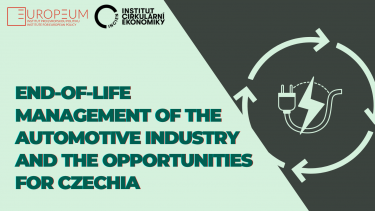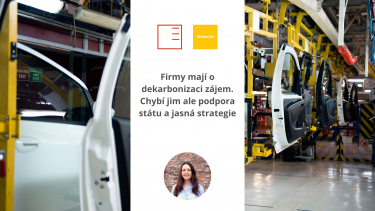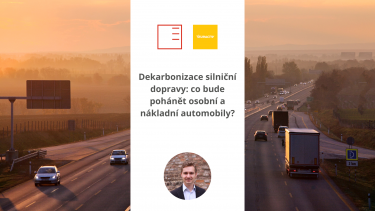Senior Researcher / Leader of a Research Programme
EUROPEUM Institute is currently looking for a Senior Researcher/Leader of a Research Programme for one of our work streams with a research focus on topics such as EU’s climate policy and decarbonization of industry, role of the EU as a global player, social dimension of EU regulatory framework, cohesion policy and/or MFF.
Show moreČT24 | Amendment to the law on emission allowances would bring changes in Czech climate policy
The Czech government is currently discussing an amendment to the law on emission allowances, according to which 100% of the proceeds from emissions trading would be dedicated to climate action. The negotiations include deciding which ministry will administer these amounts. Our senior researcher Kateřina Davidová weighed in on the issue.
Show more
Policy Paper | Overcoming barriers to unlock potential for a Just Transition in Czechia
The energy transition focuses on the swift and full decarbonization of our economies by moving away from fossil fuels such as coal, natural gas and oil towards carbon-free and preferably renewable energy sources such as wind, solar, geothermal, bioenergy and hydropower. The global community agreed to limiting the global average temperature to 1.5C to prevent worsening of potentially irreversible effects of climate change. Writes Jonathan Lyons.
Show moreEnd-of-life management of the automotive industry and the opportunities for Czechia
After three successful projects focusing on the decarbonization of the Czech automotive industry, the Green Europe team of EUROPEUM in collaboration with the Institute of Circular Economy (INCIEN) is broadening its focus and taking a more circular approach. This project will focus on better lifecycle and end-of-life management of materials used in vehicles and batteries. The collaboration will be split into two research areas.
Show more

EU-Pacific Talks: In-EV-itable future of automotive industry: what is the role of the Pacific region
We would like to invite you to the debate called "EU-Pacific Talks: In-EV-itable future of automotive industry: what is the role of the Pacific region" in the EU-PACIFIC Talks series. The debate will take place online on Tuesday, May 30 at 13:00.
Show more
Third year | Decarbonisation of the Czech automotive industry
The climate team of EUROPEUM is currently delivering the 3rd year of its project focused on the decarbonisation of the automotive industry in the Czech Republic. We want to build upon our experience and move this work forward with a more targeted approach. We will focus on three main areas, which we have identified as crucial parts of the puzzle for transitioning to cleaner modes of transport.
Show more

SUMMARY OF EXPERIENCES WITH THE INVOLVEMENT OF CSOS IN V4 IN THE DECARBONISATION PROCESS
The project is focused on the examination of the role of non-governmental organizations in the process of decarbonization of coal regions in V4 countries (Czech Republic, Hungary, Poland, Slovakia). The aim of the project is to describe the best and worst practices of the individual processes for Serbia, who awaits the transformation of its energy mix, largely based on coal. The examined V4 countries have had a slightly different share of coal in their energy mix, while the largest one being in Poland and the second largest one in the Czech Republic, followed by Hungary and Slovakia. There are many similarities and differences in their takes on decarbonisation, thus providing different range of experiences.
Show more PDF

EURACTIV: Companies are interested in decarbonisation but they lack government support and a clear strategy
According to experts, while decarbonisation is costly, without it the costs would be even higher. Our researcher Kateřina Davidová also commented on the topic at EURACTIV's Decarbonisation of the Czech and Slovak Economy 2022 conference.
Show more
EURACTIV.SK | Decarbonising road transport: what will power cars and trucks?
Our research fellow Michal Hrubý was one of the panelists in the discussion on decarbonisation of road transport. Transport is the only sector of the European economy where carbon dioxide emissions continue to rise. Road transport accounts for almost three quarters of total transport emissions.
Show moreDecarbonization of the Industrial Sector: Sustainable Finance as an Opportunity?
EUROPEUM Institute for European Policy partnered up with the institutions from the Visegrad Group countries and now leads the project consortium. The main objective of the project is to identify priority policies that will enable the decarbonisation of heavy industry in a way that is consistent with the commitments of the Visegrad Four countries to limit future global warming to 1.5 °C. To reach this objective, partners conduct original research and engage the local stakeholders.
Show more PNGStaroměstské náměstí 4/1
Prague 1 - Staré Město
110 00
tel.: +420 212 246 552
email: europeum@europeum.org
https://www.europeum.org









